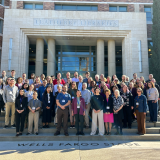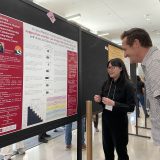Ad Astra Per Aspera; Through Adversity, to the Stars. Biological Sciences Major Sydni Au Hoy's 2022 Cheverton Speech
June 8, 2022
2022 Cheverton Trophy winner Sydni Au Hoy delivered the following speech at the 2022 Schmid College of Science and Technology Degree Ceremony held Saturday, May 21, 2022 on Wilson Field.
I want to start by thanking all of you for being here today and taking a brief moment to send a quiet thank you to the individuals whom you wish could be here today. I want to thank all the parents, guardians, family friends, and childhood heroes for guiding the path that led the Class of 2022 to Chapman. And I want to thank the Chapman community and Schmid College for taking us in and calling upon us to distinguish ourselves as the next generation of scientists.
About a year ago, my research group began the final stages of preparing our three-and-a-half-year-long project for publication in a scientific journal. As we approached the end, our mentor, Dr. Gregory Goldsmith, congratulated us with a phrase that carries the weight of my entire college experience, “ad astra per aspera; through adversity, to the stars.” It was only then I became aware of just how far we had grown from the first-year students who couldn’t even cite our sources properly. Well, sometimes we still need a little help.
None of us began with perfect pipetting skills or the knowledge of how to carefully articulate our thoughts into technical research papers. No, before we became laboratory assistants, published co-authors, and supplemental instructors, we were just college students. But what does it mean to be a college student? My dad summed it up pretty well when he said to me, “Syd, you’re always lost and always confused and you complain about everything, but it always works out.” It’s true.
Recall when we reluctantly attended our 8 AM chemistry labs, when we crowded into office hours for BIO 208 before every exam, when we spent days trying to understand the difference between Sn1 and Sn2 reactions, when we relearned kinematics for the 4th time since high school, when we coded “hello world” into python for the first time, the list goes on. Somewhere along the way, we all became scientists. And very slowly, we also started learning how to be ourselves.
I have come to realize that college is about getting lost and it’s about developing an appreciation for the process of learning. As college students, we have the opportunity to not only dream about becoming a biotech engineer, or a data analyst, or a healthcare practitioner––we have the opportunity to pursue that dream. Schmid provided us with the tools we needed to take our first steps, while Chapman offered us endless opportunities to use them. But it was our faculty, our mentors and our fellow peers who truly showed us that even as undergraduate students, we have the capacity to reach incredible achievements. We can build organizations to initiate change, we can contribute to making the college experience more equitable, we can share our research with the world, and we can do so much more. So, what’s next?
Now that we acquired some useful tools and practiced a few skills, the task actually remains the same. Take another step forward. Maybe you already know where you’re going or you’re still trying to figure that part out. Either way, whatever lies ahead will always be waiting for you and the path there is entirely your own. So, take the scenic route. Spend some time getting lost in the process, tumbling with all the sacrifices and joys of learning and growing.
I am grateful to have passed through Chapman at just the right time to spend four years alongside you all, some of the most striking and curious individuals I have ever known. Congratulations to each of you for all that you have accomplished thus far. Thank you for the time you spent here, for the contributions you have made to the Chapman community, and for your unceasing determination to conquer life’s grand challenges.
Where else is there for us to go from here if not to climb far and high enough to reach the stars? Ad astra per aspera.


